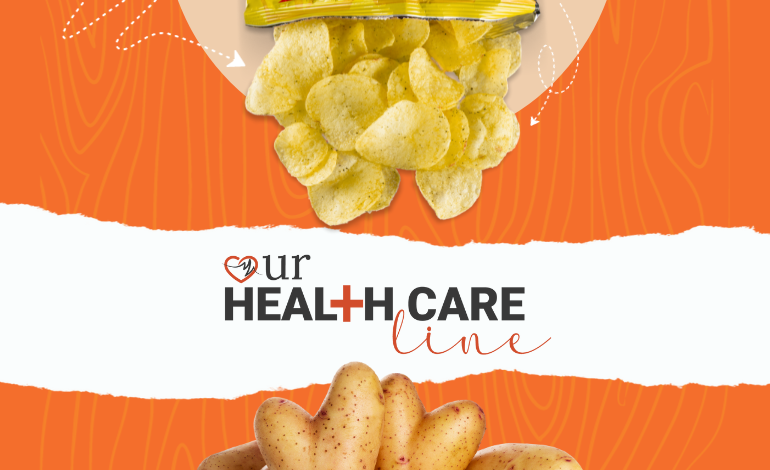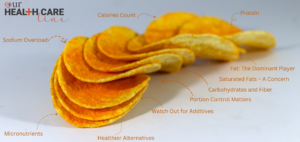
Nutrition Facts on Chip: Unveiling the Crunchy Truth
Crunchy, savory, and oh-so-tempting – that’s the allure of chips. It’s crucial to understand the Nutrition Facts on Chip, whether you’re munching on them or not. We eat them during movie nights, social gatherings, or as a quick snack; indeed, chips have secured a permanent spot in our hearts. In this comprehensive guide, we’ll peel back the layers and uncover the secrets of this beloved snack.
What Exactly Are Chips?
Before we explain nutrition facts on chips, let’s clarify what chips are. Chips, also known as crisps in some parts of the world, are thin slices of vegetables or potatoes that are deep-fried or baked until they become crispy and crunchy. They come in various flavors and styles, from classic potato chips to tortilla chips and vegetable chips.
The 10 Must-Know Nutrition Facts on Chips
1. Calories Count
Chips are notorious for being calorie-dense. On average, a single serving of chips (about 1 ounce or 28 grams) contains around 150-160 calories. Keep this in mind, especially if you’re watching your daily calorie intake.
2. Fat: The Dominant Player
When we talk about nutrition facts on chips, the first thing that comes to mind is fat. Fat is one of the primary components of chips. Most chips are fried in oil, which adds to their crispy texture but also increases their fat content. A serving of chips typically contains 10 grams of fat, with some varieties reaching up to 15 grams or more.
3. Saturated Fats – A Concern
Saturated fats, the type of fats commonly found in chips, can contribute to high cholesterol levels and heart problems when consumed excessively. A single serving of chips can contain up to 2-3 grams of saturated fat.
4. Sodium Overload
Chips are renowned for their salty taste. A standard serving can pack around 150-200 milligrams of sodium, which may not seem like much, but it can add up quickly if you consume multiple servings.
5. Carbohydrates and Fiber
Chips are primarily a source of carbohydrates. A serving typically contains 15-20 grams of carbs but lacks the essential dietary fiber that promotes digestive health.
6. Protein – A Minimal Presence
Chips are not a significant source of protein. You’ll find only a minimal amount, usually around 2 grams per serving.
7. Micronutrients Are Scarce
When it comes to vitamins and minerals, chips offer little to brag about. They are generally low in essential nutrients like vitamins A, C, and potassium.
8. Watch Out for Additives
Many commercial chips contain artificial flavors, preservatives, and additives. These can have adverse effects on your health if consumed regularly.
9. Portion Control Matters
Eating chips in moderation is key. Consuming large quantities can lead to weight gain, high blood pressure, and other health issues.
10. Healthier Alternatives
If you can’t resist the allure of chips, consider healthier alternatives like baked or air-popped chips. These options typically contain less fat and fewer calories.
Harmful Chemicals in Chips
1.Artificial Flavors and Colors
Many chips are loaded with artificial flavors and colors to enhance their taste and appearance. These chemicals can trigger allergic reactions and have been linked to behavioral issues in children.
2.Preservatives
To extend shelf life, chips often contain preservatives such as butylated hydroxytoluene (BHT) and butylated hydroxy anisole (BHA). These chemicals have been classified as possibly carcinogenic to humans by the International Agency for Research on Cancer (IARC).
3.Acrylamide
When chips are fried or baked at high temperatures, they can form a chemical called acrylamide. This compound has been associated with an increased risk of cancer, particularly in large quantities. choose chips that are cooked at lower temperatures or baked with minimal processing.
4.MSG (Monosodium Glutamate)
MSG is a common flavor enhancer used in chips and various processed foods. Based on nutrition facts on chips, it’s generally recognized as safe; however, some individuals may experience adverse reactions such as headaches, sweating, and nausea.
The Health Risks Associated with Chip Consumption
1. Obesity
Chips are calorie-dense and often low in nutrients, making them a prime contributor to weight gain and obesity when consumed in excess. Their high salt content may also trigger overeating.
2. Cardiovascular Disease
The unhealthy fats in chips can raise levels of LDL cholesterol, increasing the risk of atherosclerosis (hardening of the arteries) and heart disease.
3. High Blood Pressure
The excessive sodium in chips can elevate blood pressure, potentially leading to hypertension, a major risk factor for heart disease and stroke.
4. Type 2 Diabetes
Regularly indulging in chips may contribute to insulin resistance and an increased risk of type 2 diabetes due to their high glycemic index.
5. Acrylamide-Related Concerns
When chips are fried or baked at high temperatures, they can form acrylamide, a potentially harmful chemical. While its health effects in humans are still under study, it has been associated with an increased risk of cancer in animal studies.
Conclusion
In the world of snacks, chips hold a special place. However, it’s crucial to enjoy them in moderation and be aware of the nutrition facts. While they may not be the healthiest option, occasional indulgence is unlikely to harm you. To maintain a balanced diet, make sure to incorporate a variety of nutrient-rich foods alongside your favorite chips. Remember, knowledge is power, and understanding the nutrition facts on chips empowers you to make informed choices about your snacking habits.





